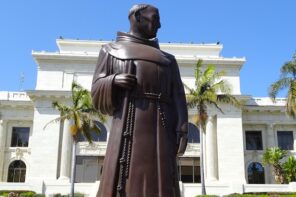Despite being embroiled in two high-profile sex scandals—one over allegations of his own conduct and one over the St. Paul-Minneapolis Archdioceses’ mishandling of clerical sex abuse—and calls from both the New York Times and the Minneapolis Star-Tribune for a change in leadership in the archdiocese, Archbishop John Nienstedt said on Wednesday he would remain.
Quoting Second Chronicles 20:15, Nienstedt cast himself as the embattled leader fighting an invading force and suggested the charges against him were the result of enemies he had made for his strong stance against same-sex marriage.
In a more than slightly creepy analogy given the rampant pedophilia crisis in the archdiocese and suspicions that the church’s reflective patriarchy makes it blind to the problem until it becomes impossible to ignore, Nienstedt said in his column in the Catholic Spirit that a “bishop’s role is more like that of a father of a family than that of a CEO.” He said he was “bound to continue in my office as long as the Holy Father has appointed me here.”
Despite asserting that he had “acknowledged my responsibility in the current crisis we face,” Nienstedt denied that he had “knowingly covered up clergy sexual abuse” and said that allegedly widespread problems with the disciplining and tracking of abusive priests resulted because he was “too trusting of our internal process and not as hand-on as I could have been in matters of priest misconduct.”
In addition to having been misled by his own fatherly, trusting nature, Nienstedt said the past year had been “difficult” because of the two investigations, numerous messages calling him a “hypocrite” and a “liar,” and the repeated calls for his resignation, which he dismissed as grumbling about his leadership that began when he arrived in the diocese seven years ago.
Saying the “suffering we have endured” is now “bearing fruit,” he pledged a new “Victims First” philosophy and said he had “empowered a new team” of clerical and lay Catholics, including a new victims’ liaison, to assist him, help abuse victims, and implement new protocols to prevent abuse. (It was the archdiocese’s previous victims’ liasion who unleashed the current scandal when she charged that the leadership had been lax in its prevention and accounting of abuse.)
It’s the kind of “apology” that many church officials have become practiced at when dealing with mushrooming sex abuse scandals: admit what they can no longer deny (but no more), deny any actual wrongdoing on the part of those charged with policing priests and abuse, and pledge a “new day” from here on in.
In a statement, the Survivors Network of those Abused by Priests said that Nienstedt
continues to pretend that his deliberately deceptive behavior—over years—is just well-intentioned laxness, when ample evidence shows that’s just not true. He has repeatedly and knowingly protected predators and endangered kids. He claims he’s not been ‘hands on’ enough. That’s just not true. He’s been plenty ‘hands on,’ but directed in precisely the wrong direction—toward secrecy, not safety.
In his column and in interviews with local papers, Nienstedt also denied the allegations reportedly made in ten sworn statements that he had engaged in homosexual relationships as he made his way up the hierarchical ladder. He told the Star Tribune, “I’m not gay,” but said, “I made a lot of enemies by the stands I’ve taken in Detroit and here. I assume it feeds into that.”




